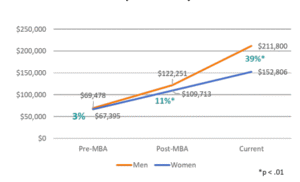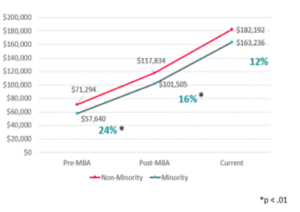FOR IMMEDIATE RELEASE
Is an MBA an economic mobility engine for women and minorities?
- Forté Foundation study shows income climbs over 63% or more for underserved post MBA
- Pay gap widens for women vs. men, but narrows for minorities vs. non-minorities overall in first post-MBA job
- However, in present position minority women make 52% less than non-minority men
Austin, TX/Jan. 17, 2019 – Does an MBA hold the key to helping women and minorities boost their earning power and increase equality in the workplace? Part one of a new research series from the Forté Foundation, a non-profit focused on women’s advancement, reveals mixed results.
The online survey of 900 male and female MBA alumni who graduated between 2005-2017, was conducted by Forté Foundation and led by Michelle Wieser, Interim Dean, School of Business, St. Catherine University. Key highlights include:
- Women earn less than men in their last pre-MBA job – and the pay gap does not improve post MBA.
- The pay gap narrows for minority women and men (defined as Black or African American, Hispanic or Latin American, or Native American) in their first post-MBA job and beyond, compared with non- minority peers -- yet they still earn less than non-minorities from pre-MBA to their present position.
- Despite the gender pay gap, the data show a positive return on investment from the MBA with an over 63% salary bump, or higher, for both minority and non-minority women and men.
- Women with an MBA don’t advance to the same level as men, have fewer direct reports, and less job satisfaction. And, overall, minority MBA graduates had lower career satisfaction than non- minorities in two areas -- their current salary and career progression since obtaining an MBA.
- Around 40% of respondents, primarily women, say they’ve experienced a gender pay gap. How do they combat it? The top responses were: “I have not taken action and do not intend to” and “I left the company.”
“It’s encouraging to see an MBA provides greater economic mobility for women and minorities and narrows the pay gap for minorities in their first job post MBA,” said Elissa Sangster, CEO, Forté Foundation, “but the whopping gender pay gap and income disparity for women and minorities needs to be addressed, and soon.”
“While some salary disparity can be explained by the job functions women choose, there is likely unconscious bias and other factors at play,” Sangster added. "When we asked women MBAs how they intend to address the gender pay gap they’ve experienced, it’s more common for them to leave the company rather than speak about it with their manager, human resources or company leadership. This is a wake-up call -- companies need to take proactive steps to lessen the pay gap, or risk losing highly-
skilled women employees."
Additional research insights and data include:
Gender Pay Gap
Is there a gender pay gap? Overall 55% of respondents believe that a gender pay gap “probably or definitely” exists.
- Only 1 in 3 men think there’s a gender pay gap versus 2 in 3 women (Men 34%, Women 65%)
- A greater percentage of minorities believe that a gender pay gap “probably” or “definitely” exists (Women: 68% minority; 63% non-minority; Men: 44% minority, 33% non-minority).
- Respondents estimate the gap to be around 24%, with men earning 24% more than women. The actual gender pay gap reported in this study was 39% (adjusted for years of experience), representing over $58,994 in annual compensation.
Compensation - Gender
- When examining overall compensation for men and women in their last pre-MBA position, first post-MBA job, and their current role, men earned more than women at each juncture.
- The gender pay gap widened between women and men post MBA. On average, women earned 3% less than their male counterparts pre-MBA, the gap widens to 11% for first post-MBA position, and 39% for current compensation, adjusted for years of experience.
- The research data also showed a positive return on investment from the MBA with a 63% salary bump for women and 76% for men from the last pre-MBA job to the first post-MBA role.
Compensation by Gender Compensation by Race


Compensation – Race
- For minority women and men, the return on investment is even greater than non-minorities in their first post-MBA job in terms of a salary bump: Women (minority 70%, non-minority 63%); Men (minority 84%, non-minority 70%).
- And the pay gap narrows post MBA between minorities and non-minorities. (24% pre-MBA, 16% first post-MBA job, 12% current role)
- Yet minorities still earn less than their non-minority peers at every juncture from pre-MBA to their current job. The most notable pay gap is between non-minority men and minority women in their current position, a difference of 52% or $76,589.
Compensation: US Minority Versus Non-Minority (Women Vs. Men)

Job functions and gender pay gap
Participants in this study were asked to provide their current job function which allows a deeper dive into what might be driving the gender pay gap with current compensation.
- The job functions shown to contribute the most to the gap are Finance (60% gap) and Operations (48% gap). Marketing is the only function where women were shown to earn more than men (2%).
- Interestingly, women significantly outnumber men in Marketing and Human Resources, while men outnumber women in Finance, General Management, Consulting, and IT.
Career Advancement and Opportunity
In addition to compensation, this study examined other typical measures of career progression including number of promotions and direct reports plus level-title, since the first post-MBA position.
- The outcomes revealed that, on average, men have received 2.3 promotions since completing their MBA program, while women have only received 1.8.
- Men have an average of 3.3 individuals reporting to them, women only have an average of 1.8.
- Men have achieved, on average, the equivalent of the Director level within their organizations; women trail behind one rung on the career ladder with an average level of Senior Manager.
- There were no statistically significant differences for minorities versus non-minorities.
Career Satisfaction
The research examined six elements of career satisfaction including: current role, company, their level within the organization, number of direct reports, current compensation, and career progression to date. Men have achieved higher levels of career satisfaction than women across all six elements.
- The number of direct reports women have, and their current compensation, are the biggest sources of career dissatisfaction for women.
- Overall minority MBA graduates had lower career satisfaction than non-minorities in two areas -- their current salary and career progression since obtaining an MBA.
METHODOLOGY
The online survey of 900 MBA graduates from the years 2005 through 2017 was conducted in March and April 2018. It was distributed through the Consortium for Graduate Study in Management, Forté Foundation sponsor schools and the Forté Foundation database of alumni. Additional respondent characteristics are included in the full research findings in this link.
FORTÉ SPONSORS
Forté Sponsor Companies: A.T. Kearney; Accenture; Amazon; American Airlines; AT&T; Bank of America Merrill Lynch; Barclays; Bloomberg; Boston Consulting Group; Capital Group; Cargill; CarVal; Chevron; Citi; Cognizant; Credit Suisse; Danaher; DaVita; Deloitte; Deutsche Bank; Dow; Eli Lilly and Company; Evercore; ExxonMobil; EY; Goldman Sachs; Google; Greystar; Guggenheim Partners; Hines; IBM Global Business Services; Invesco; JP Morgan; KPMG; Lazard; Liberty Mutual; Masco; M&T Bank; Macquarie Group; McKinsey & Company; Morgan Stanley; MUFG; PIMCO; Prologis; State Street; The PNC Financial Services Group; T-Mobile; US Cellular; Vanguard, Walmart; Wells Fargo Securities; Whirlpool Corporation
Forté Nonprofit Sponsors: 100 Women in Finance; CFA Institute; Graduate Management Admission Council (GMAC)
Forté Business School Sponsors: Alliance Manchester Business School; Arizona State University W.P. Carey School of Business; Babson College (F.W. Olin Graduate School of Business); Carnegie Mellon University (Tepper School of Business); Columbia Business School; Cornell University (Johnson School of Management); Dartmouth College (Tuck School of Business); Duke University (The Fuqua School of Business); Emory University (Goizueta Business School); ESADE Business School; Georgetown University (McDonough School of Business); George Washington University School of Business; Georgia Tech (Scheller College of Business); Harvard Business School; HEC-Paris; IE Business School; IESE Business School; Imperial College Business School; Indiana University - Bloomington (Kelley School of Business); IMD Business School; INSEAD; London Business School; Massachusetts Institute of Technology (Sloan); Michigan State University (Broad College of Business); New York University (Stern School of Business); Northwestern University (Kellogg School of Management); Ohio State University Fisher College of Business; Queen’s School of Business; Rice University Jesse H. Jones Graduate School of Business; Southern Methodist University (Cox School of Business); University of California - Berkeley (Haas School of Business); University of California - Los Angeles (Anderson School of Management); University of Cambridge (Judge Business School); University of Chicago (Booth School of Business); University of Illinois Urbana-Champaign (College of Business); University of Maryland Smith School of Business; University of Michigan (Ross School of Business); University of Minnesota - Twin Cities (Carlson School of Management); University of North Carolina (Kenan-Flagler Business School); University of Notre Dame (Mendoza College of Business); University of Oxford (Saïd Business School); University of Pennsylvania (The Wharton School); University of Rochester (Simon School of Business); University of Southern California (Marshall School of Business); University of Texas at Austin (McCombs School of Business); University of Toronto (Rotman School of Management); University of Virginia (Darden School of Business); University of Washington (Foster School of Business); University of Wisconsin-Madison (Wisconsin School of Business); Vanderbilt University Owen Graduate School of Management; Washington University in St. Louis (Olin Business School); Western University (Ivey School of Management); Yale School of Management; York University
(Schulich School of Business)
ABOUT FORTÉ Forté is a nonprofit organization with the goal of achieving gender parity at all levels of business. Forté works closely with business schools, corporations, and universities to ensure women have access to opportunities at every stage in their careers. Forté offers a wide variety of resources, including MBA prep, professional development, leadership education, and a diverse community of successful women. For more information, visit fortefoundation.org. Media contacts: Michele Vana, BCW Global, michele.vana@bcw-global.com; Katie Stanfield, Forté Foundation, katies@fortefoundation.org Download the PDF









